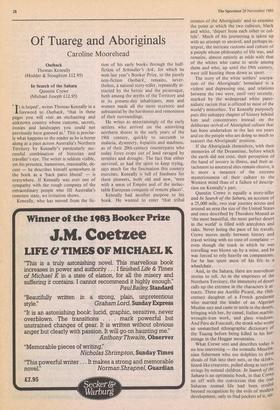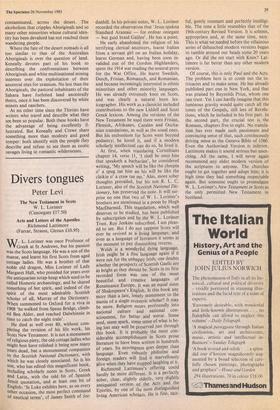Of Tuareg and Aboriginals
Caroline Moorehead
Outback Thomas Keneally (Hodder & Stoughton £12.95) In Search of the Sahara Quentin Crewe (Michael Joseph £12.95) Tt is hoped', writes Thomas Keneally in a
foreword to Outback, 'that in these pages you will visit an • enchanting and unknown country whose customs, secrets, ironies and landscapes you could not previously have guessed at.' This is precise- ly what happens to the reader as he is borne along at a pace across Australia's Northern Territory by Keneally's particularly suc- cessful combination of historian and traveller's eye. The writer is seldom visible, yet his presence, humorous, reasonable, de- cent — he describes himself somewhere in the book as a 'back patio liberal' — is everywhere. If Keneally was ever out of sympathy with the rough company of the extraordinary people who fill Australia's remotest state, no irritation shows.
. Keneally, who has moved from the tic-
tion of his early books through the half- fiction of Schindler's Ark, for which he won last year's Booker Prize, to the purely non-fiction Outback, remains, never- theless, a natural story-teller, repeatedly at- tracted by the heroic and the picaresque, both among the myths of the Territory and in its present-day inhabitants, men and women made all the more eccentric and substantial by the harshness and remoteness of their surroundings.
He writes as entertainingly of the early settlers who arrived on the uninviting northern shores in the early years of the 19th century, quickly to succumb to malaria, dysentery, hepatitis and madness, as of their 20th-century counterparts who today force crops out of land ravaged by termites and drought. The fact that either survived, or had the spirit to keep trying, says much for the fascination this country exercises. Keneally is full of fondness for these pioneers, both old and new, 'men with a sense of Empire and of the ineluc- table European conquest of remote places'.
Keneally had another purpose to his book. He wanted to enter 'that tribal cosmos of the Aboriginals' and to examine the point at which the two cultures, black and white, 'depart from each other or col- lide'. Much of his journeying is taken up with an attempt to unravel, and perhaps in- terpret, the intricate customs and culture of a people whose philosophy of life was, and remains, almost entirely at odds with that of the whites who came to settle among them and who, up until the 19th century, were still hunting them down as sport.
The story of the white settlers' usurpa- tion of the Aboriginals' homeland is a violent and depressing one, and relations between the two were, until very recently, marked by the widespread white pater- nalistic racism that is offered to most of the world's minorities. Yet Keneally purposely puts this unhappy chapter of history behind him and concentrates instead on the deliberate revival of Aboriginal culture that has been undertaken in the last ten years and on the people who are doing so much to reassert the Aboriginals' position.
If the Aboriginals themselves, with their memories of the Dreamtime, before which the earth did not exist, their perception of the hand of sorcery in illness, and their at- tachment to ancestral sites remain elusive, it is more a measure of the extreme mysteriousness of their culture to the , Western mind than of a failure of descrip- tion on Keneally's part.
Quentin Crewe is equally a story-teller and In Search of the Sahara, an account of
a 25,000 mile, two year journey across and around an area the size of the United States and once described by Theodore Monod as `the most beautiful, the most perfect desert in the world' is filled with anecdotes and tales. Never losing the pace of his travels, Crewe moves easily between history and travel writing with no tone of complaint - even though the truck in which he was travelling was blown up by a mine, and he was forced to rely heavily on companions, for he has spent most of his life in a wheelchair.
And, in the Sahara, there are marvellous stories to tell. As in the emptiness of the Northern Territory, the immensity of desert calls up the extreme in the characters it at- tracts. There are Aurelie Picard, the 19th- century daughter of a French gendarme who married the leader of an Algerian Muslim sect and came to settle in the desert, bringing with her, by camel, Italian marble, wrought-iron work, and glass windows. And Pere de Foucault, the monk who wrote an unmatched ethnographic dictionary of the Tuareg before being killed in his her- mitage in the Hoggar mountains.
What Crewe sees and describes today is no less interesting — the nomadic Maurita-
nian fishermen who use dolphins to drive
shoals of fish into their nets, or the skinks, lizard-like creatures, pulled along as toys on strings by nomad children. In Search of the Sahara is an optimistic book, in that Crewe set off with the conviction that the true
Saharan nomad life had been eroded beyond recognition by the evils of modern development, only to find pockets of it, un- contaminated, across the desert. The alcoholism that cripples Aboriginals and so many other minorities whose cultural iden- tity has been devalued has not reached these wandering people.
Where the fate of the desert nomads is all too similar to that of the Australian Aboriginals is over the question of land. Keneally devotes part of his book to describing the confrontations between Aboriginals and white multinational mining interests over the exploitation of their ancestral sites for uranium. No less than the Aboriginals, the pastoral inhabitants of the Sahara have forfeited land ancestrally theirs, once it has been discovered by white miners and ranchers.
At no other time since the Thirties have writers who travel and describe what they see been so popular. Both these books have the advantage of being excellently il- lustrated. But Keneally and Crewe share something more than modesty and good temper: both identify with the people they describe and refuse to see them as exotic savages living in romantic wildernesses.















































 Previous page
Previous page